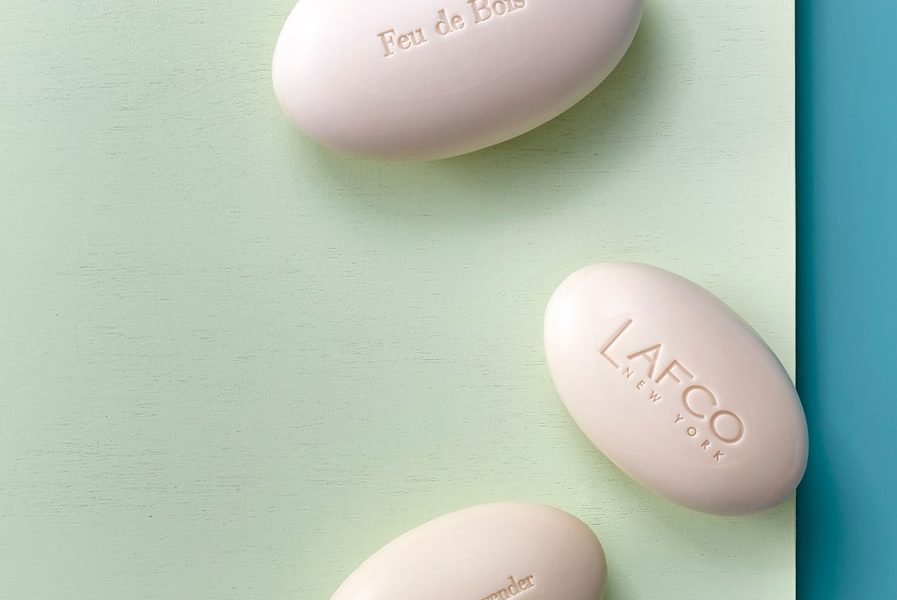In response to concern that palm oil farming is contributing to the global environmental damage and climate change, LAFCO has removed palm oil from its bar soaps. LAFCO’s new soap formula replaces palm oil with 75 percent olive oil, 25 percent coconut oil, and a touch of argan oil, thus preserving the soap’s high moisturizing and cleansing qualities while using alternatives to palm oil.
Oils and fats are important ingredients in soap because they are part of the chemical reaction that makes soap an effective cleaning agent. Palm oil is a more saturated fat that became popular in beauty and cleansing products because it helps harden soap, it is vegan, and it costs less than other vegetable oils. While it is more difficult to make rich, durable soap from unsaturated fats like olive oil, it is entirely possible, and this is what LAFCO has done. LAFCO air-dries each bar of soap for a month, reducing the amount of water in the bars and making them firmer and longer-lasting.
The palm oil industry is enormous (around $47 billion a year), and various forms of palm oil are common ingredients in many of the products we use daily. For example, the world’s best-selling soap, Unilever’s Dove brand, uses palm oil. Besides its use in soap, palm oil is a significant biofuel, a food additive that creates a smooth and creamy texture, and a stabilizing agent that helps bind products together. It is estimated that over 70 million metric tons are now produced annually and that palm tree plantations cover an area larger than New Zealand, mostly in Indonesia and Malaysia.
The debate over palm oil stems from the way it is farmed. Demand for the oil has caused the clearing of forests — specifically rain forests in tropical countries — to make room for the cultivation of enormous palm tree farms that stretch horizon to horizon. Palm oil farming is one of the causes of the deforestation of ecologically rich places like Borneo, where the tropical forest cover has fallen from 76% to 28% of total land area between 1973 and 2010. The harmful effects of such deforestation are numerous, from loss of habitat for species such as orangutans, to deadly smoke from fires, to the dumping of carbon into the atmosphere, which adds to global warming.
LAFCO is taking a cautious route by using alternatives to palm oil in soap production, even though advocates of palm oil cite its positive aspects, such as the economic benefits of the palm oil industry and the high productivity of palm oil trees compared to other oil-producing plants. However, in the end, we must face the fact that land continues to be cleared at a startling pace, and LAFCO does not want to be a part of the problem.
LAFCO is going the extra step of avoiding palm oil even when it is certified by the Roundtable on Sustainable Palm Oil (RSPO), a voluntary organization of industry participants who create and manage global standards of sustainability.
Various watchdog organizations and journalists have criticized the RSPO for not being effective. For instance, in its 2013 report Certifying Destruction, Greenpeace announced, “The RSPO wants its members to be industry leaders in sustainability, but its current standards leave them free to destroy forests,” and recommends that “companies seeking deforestation-free palm oil now need to go beyond the RSPO to break the link between palm oil and deforestation.”
In addition, a 2016 article in Scientific American, “Can Oil Palm Plantations and Orangutans Coexist,” states: “…some conservationists see the RSPO as a cynical exercise in “greenwashing”—dressing up business-as-usual practices with a semblance of environmental stewardship while shirking any real change.”
Taking these criticisms and concerns to heart, LAFCO has become one of a small number of soap makers avoiding an ingredient known to contribute to deforestation. At the same time, LAFCO bar soaps still retain their natural fragrances, produce rich lather, and are hypoallergenic and free of sulfates, parabens, and other synthetic ingredients.
Shop LAFCO Bar Soap here.
Sources:
- www.scientificamerican.com
- www.greenpeace.org
- www.ucsusa.org (Union of Concerned Scientists)
- www.rankabrand.org/cosmetics/Dove
- www.bizvibe.com/blog/top-10-soap-brands-in-world/
- www.unilever.com


